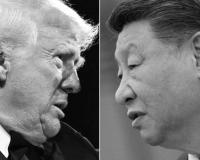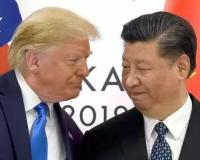Trump Tariffs : What will Trump do for 90 days, when he has shocked the world every day on tariffs?
Given Trump's rhetoric on tariffs so far, the decision to postpone it for 90 days proved to be a major reversal. The share market also saw a surge after this. However, Trump announced a 125% tariff on China while leaving the rest of the countries free from tariffs. Due to which uncertainty remains in the market. Let us know what will happen in the next 90 days on the tariff.

Why does American President Donald Trump wake up every morning and shock the world? Trump, who has been making new announcements about tariffs every day since becoming president again, did something on Wednesday that made people say, "Mr. President Enough Now." In fact, after announcing the tariffs, Trump declared April 2, 2025 as the day of liberation for America, on April 9, the announcement of the same tariffs was postponed for 90 days (except for China). Considering Trump's rhetoric on tariffs so far, the decision to postpone it for 90 days proved to be a major reversal and the stock market also saw a jump after it. However, Trump announced to impose 125% tariff on China, while allowing the rest of the world to be exempted from tariffs. Due to which uncertainty remains in the market.
As Trump announced his new move on his Truth social media account, Wall Street and markets across Asia showed strength. Trump posted, "I have agreed to suspend the tariffs for 90 days. The reason for this decision is to come forward for trade talks with more than 75 countries and avoid retaliation."
After Trump's decision to withdraw the tariffs, the major index of the American stock market S&P 500 registered an increase of 9.5%. According to the S&P, Wednesday was the market's third best day since 1940. The Dow Jones also jumped nearly 3,000 points after Trump's decision. This helped offset some of the losses in the market after the tariff announcements. Although most of the countries of the world breathed a sigh of relief from the decision to withdraw the tariffs, Trump made it clear that the tariffs on China will continue. It will only increase the pressure.
Let's know why the Trump administration did not let China live?
Trump's decision to isolate China through tariffs isn't just economic—it's deeply personal and strategic. "They were very insulting. They didn't respond. They retaliated," Trump said after China announced new tariffs of 84% on American goods. Trump has long viewed China as the main villain on the economic front. He has accused Beijing of dumping cheap goods, manipulating currency markets and stealing American intellectual property. He has also repeatedly claimed that Chinese leaders do not understand how to negotiate with them. Talks between Washington and Beijing have stalled for months. Trump said in his statement, "China wants to do a deal. But they don't know how to do it."
Donald Trump's allies say the 125% tariff is aimed at persuading Beijing to negotiate. But it also aims to protect American manufacturing. The Trump administration argues that it wants to avoid "flooding the world with junk (Chinese goods)". According to White House press secretary Carolyn Levitt, China is 'being aggressive' while the rest of the world is 'closer to us.' He said to reporters, "We are trying to show that the rest of the world will come to China, but we are actually seeing the opposite."
Why did the tariff hold decision gain importance?
Donald Trump has taken his confrontation with China to a new level in the global trade war by suddenly deciding to roll back tariffs. However, he has also expressed his willingness to use the remaining economic shocks as a negotiating tool. Trump is trying to isolate Beijing by exempting most countries from tariffs at least temporarily. Their purpose is also to unite colleagues. On the other hand, the escalation of tensions with China has taken the already brutal trade war between the world's two largest economies to a new and dangerous turn. Trump has refused to back down on tariffs and said, "Aapko lakshi hona hoga". However, he also mentioned the turmoil in the financial environment. "After the announcement of the tariffs, people were thinking a little out of line, they were getting irritated, they were a little scared," Trump said.
Trump's verdict ka kya matlab hai?
The decision to postpone the tariff for 90 days at least proves that no matter how important the step is, if the economy is playing a bandwagon, Trump will not delay in taking a U-turn. Trump's administration argues that threats of tariffs have drawn global powers to the negotiating table. This includes countries that were once hostile in terms of trade outlook.
White House press secretary Carolyn Levitt said, "The whole world is talking to America, not China, because they need our markets." The decision to stop the tariff was not taken without any motive. Trump acknowledged that he studied the "very complex" US bond market and saw that yields were rising despite falling stocks. It's a warning sign that rattled both investors and the White House. Behind the scenes, his aides insist that it (retaliatory tariffs) is part of Trump's broader strategy.
Treasury Secretary Scott Besant called the decision to withdraw tariffs a deliberate strategy. He said, "This was their strategy from the beginning. Trump pushed China into a bad situation with his steps." However, the President himself refuted this sweeping comment and accepted that he was reconsidering the tariff due to recent market changes. He said, "Abhi Kuch Bhi Khamin Hua Hai."
What will happen in the next 90 days?
The next 90 days after the announcement of tariff withdrawal will prove to be very important for the whole world. In the meantime, the US will strive to bring the negotiation process to a successful conclusion with its trading partners. If any agreement is reached then it will be a good news for the world. But, if the talks behind the scenes fail in the next 90 days, the whole world will be in the grip of recession. Besant affirmed that the US will continue its dialogue with various countries.
However, one of the most important points among these hopeful speculations is that there is no guarantee that Trump will not make any further changes to his current policy. They can surprise the world by announcing anything at any time. Now it is clear. "We can only guarantee that America will negotiate in good faith in a good environment," Besant said, suggesting that talks with Japan, South Korea, India and Vietnam are already underway. But China is walking on a different path, this is not the way it is. Trump is trying to surround Xi Jinping's government. They think that Xi Jinping will be forced to bow under pressure.
China's stand?
Beijing has signaled further retaliation but so far, its 84% tariff is significantly lower than Trump's. China on Thursday announced an 84% tariff on US goods. China's Ministry of Commerce issued a stern warning to the US, saying, "If they (the US) insist on increasing their economic and trade sanctions, China has the willpower and abundant resources to take the necessary countermeasures and fight to the end."
China has also contacted other countries after the tariff increase by Trump. It seems that China is trying to form an alliance to force Washington to back down. However, even after several days of efforts, China seems to be getting partial success in this. Many countries are unwilling to ally with China in a trade war with President Donald Trump.








.jpeg)

